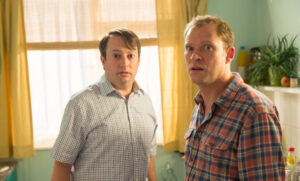There’s something beautifully still and calm about collections of TV scripts: frozen in time, notionally occupying that sweet spot between the magic of writing and the magic of acting. And, as they’re published after everything’s been shot and cut and aired and watched and reviewed and garlanded, a script anthology is also the last word. It’s a warm glug of methadone after the primo fix of a beloved show has ended for good.
And the highly addictive Succession certainly finished this year on an exquisite low. After four seasons of total, late-capitalist landscaping, creator Jesse Armstrong and his peerless writing team wrapped it up with pitch-perfect bathos: sad prince Kendall Roy all beaten and droopy, watching the river flow, forever haunted by a drowning. We can’t go on with his story, or those of the other characters. But we can go back, and go in.
This year brought us the 39-episode codex, in four massive slabs. Paperback, but you still wouldn’t want to drop one on your foot. Irresistible to fans jonesing for more, and catnip to writers at any career stage, from the aspiring to the retiring. The volumes offer insight to anyone keen to understand the mechanics, the physics, of scriptwriting. All that palaver of moving pretend people through space, making them collide. The fine-tuned precision-engineering of it. Scripts are like Haynes Manuals, a chance to poke about under the bonnet, under the skin. Here’s drama in musculoskeletal form. Messy humanity, fictional and real.
I can’t have been the only one to head straight to the penultimate episode, to the funeral, with that coruscating eulogy for the dead king Logan Roy from his brother Ewan. It was an electrifying moment on screen. Before he despairingly takes apart the “meagreness” of Logan’s worldview, we get two startling revelations about Logan the child. That he believed, and was allowed to believe, he gave his baby sister polio. And, when the two little brothers were crossing the Atlantic in wartime, the ship’s engines failed. “They told us — they told us children — if we spoke or coughed or moved an inch the U-boats would catch the vibrations off the hull and torpedo us and we’d die in the drink, in the hold there. Three nights and two days we stayed quiet — a four-year-old and a five-and-a-half-year-old speaking with our eyes.”
Ewan’s speech looks quiet on the page but when the words were spoken by James Cromwell, echoing in the huge, vaulted guts of a church, they stopped me breathing. The words on the page, and the memory of their glory on screen, fold in upon one another to form a 3-D version, an origami of the watched, the heard and the read.
However, the written word, that’s your ur-text. It comes before the crackling back and forth, the rounds of table reads, rehearsals, rewrites, notes, on-set swerves, additional dialogue recording, all the way to the final edit. But, counterpoint to the Ewan eulogy: often a halting, nothingy-looking, scrambled line on the page can ring out, as your inner ear bones hear the character. Here’s Kendall starting his eulogy: “Um, I’m going to try to — just to stand in for my brother and — I have his, our, words, my sister’s and my brothers’ but — I’m — I — I want to — Some things have been said and I want to, to respond or, um, excuse me, I will try to find the words.”
The writers of Succession were — are — not only pretty much the best screenwriters in the world but also the most respected.1 Not least by Armstrong, a mensch who believes in the collaborative nature of writing. I was in the same gang as him years ago, in the early days of Armando Iannucci’s The Thick of It, when Armstrong and Sam Bain were steering Peep Show to glory. He was always generous and supportive on Thick, where everyone got a pass on everyone else’s script. Pages were marked by Iannucci for newcomers with notes such as “Is there anything in Malcolm already knowing what’s happened? Could do with losing a third of all this.” When you were judged to be up to speed, it would be just a line marking the dialogue and a single word: “shorter”, “funnier”, and the one that looked absurdly vague but actually gave you freedom to think outwards: “better”.
The best advice on writing I ever heard was from Bain, who said you should never strain for the right line, that you should be supple, not clenched. It’s a universal truth, and you can feel that credo rippling through the Succession scripts. In her introduction to Season Three, Lucy Prebble describes how the writers’ room resonated with “maybes” as, over weeks, stories evolved and hardened. How “a trick of writing is to stay open until you absolutely have to close down the narrative”, how the deliberate uncertainty of maybe carried over into the scripts. And it is striking how often, in action lines, a character is given the freedom to explore: “Josh maybe takes a bite, or checks his phone — a subtle gesture to betray confidence, before he casually slides in the blade.”
Uncertainty as a positive. The final season of Succession aired in the middle of the months-long WGA writers’ strike, in an era of profound uncertainty in the world of TV. Streamers were just a few years ago juddering around like the giants from Game of Thrones, clubbing rivals out of the way with obliterating budgets. Now there’s a reining in, a dialling down. This year, two Big Questions hung quaveringly in the air, in corporate boardrooms resembling the glassy brain-stem of Waystar Royco: “Is this the end of TV’s Golden Age? and “Could AI write this?”
Inevitably, up popped the articles asking another question, perhaps the stupidest ever: “Could AI write Succession?” Spoiler alert: it could not. GPT4 took a shot at a two-hander and it wasn’t very good. This attempt at a closing scene for the finale is better, but only because it’s funnier — because it’s shit:
The siblings stand together, a united front. They address the board.
KENDALL: We’ve agreed to a power-sharing arrangement with Stewy and Sandi.
SHIV: (nods) We’ll each take on a significant leadership role.
ROMAN: We’ll face the future together. As a family.
The siblings exchange glances, signalling their commitment to each other and the company. The future is uncertain, but they’re prepared to face it head-on.
This one’s spookier, because the AI has the Roy family discuss the promise of AI, in exquisitely non-silky dialogue. Also, the AI sounds a bit up itself to be honest. “The room collectively exhales, relieved by Logan’s openness to explore AI’s potential.”
Ah yes, AI’s potential. The WGA strike ended in victory for writers because producers agreed with a straight face that AI would only be a tool, that it wouldn’t be used to replace part of the writing process. But some of us remember being on strike as journalists in the Eighties, when Murdoch smuggled in his scabs and his computers: publishers assured everyone that the new digital process was a tool, and posed no threat to either writers or sub-editors. In truth, it was a meteorite that virtually wiped out the latter and critically devalued the former. The internet then hoovered up small ads, wiped out local journalism, offered news for free and the rest is podcast.
But Luddites never win. And look, nobody’s saying AI can’t come up with killer lines, as screenwriter Simon Rich points out. He adduces the creation of fake The Onion headlines by the code-davinci-002 program — “Experts Warn that War in Ukraine Could Become Even More Boring”. But really, how do you replicate the capricious meanderings of the writers’ room? Is it possible to create one from a diverse group of wise-cracking algorithms, programmed to variously have imposter syndrome, diffidence disguised as arrogance, arrogance disguised as diffidence, sundry neuroses, lurching random kindnesses and seven variants of panic?
If so, Succession’s creative process might end up being the last of the human-only writers’ rooms. Or maybe the money will run out and we’ll enter a new Bronze Age of TV and Succession will turn out to be the last of the gold-standard shows.
But then, the future of television has been in doubt before. In 1954, for instance, when the Independent Television Authority was created, which ended the BBC’s broadcasting monopoly, introduced ITV and ad breaks, and foreshadowed a 21st-century TV culture driven and riven by money. The fearsome Lord Reith certainly didn’t hold back: “Somebody introduced Christianity into England and somebody introduced smallpox, bubonic plague and the Black Death. Somebody is minded now to introduce sponsored broadcasting.”
I wonder what Reith would have made of Succession. Would the defender of innovation be pleased a Shakespearean tradition still has resonance? Logan Roy as Lear, at odds with his serially disappointing children. Kendall a method-acting Richard the Third, tragically trying until the last to horse-trade his kingdom.
It all starts with scribbled notes and a MacBook Air. Succession was, by a distance, the best telly on telly for years. And these scripts show why. Writing. What made it so great was the writing.
FOOTNOTES
- They deserve to be named here: Jesse Armstrong, Tony Roche, Jon Brown, Lucy Prebble, Georgia Pritchett, Jonathan Glatzer, Ted Cohen, Will Tracy, Susan Soon He Stanton, Alice Birch, Mary Laws, Francesca Gardiner, Lucy Kirkwood, Jamie Carragher, Gary Shteyngart, Nathan Elston, Miriam Battye, Cord Jefferson, Callie Hersheway, Will Arbery and Anna Jordan.
Disclaimer
Some of the posts we share are controversial and we do not necessarily agree with them in the whole extend. Sometimes we agree with the content or part of it but we do not agree with the narration or language. Nevertheless we find them somehow interesting, valuable and/or informative or we share them, because we strongly believe in freedom of speech, free press and journalism. We strongly encourage you to have a critical approach to all the content, do your own research and analysis to build your own opinion.
We would be glad to have your feedback.
Source: UnHerd Read the original article here: https://unherd.com/




